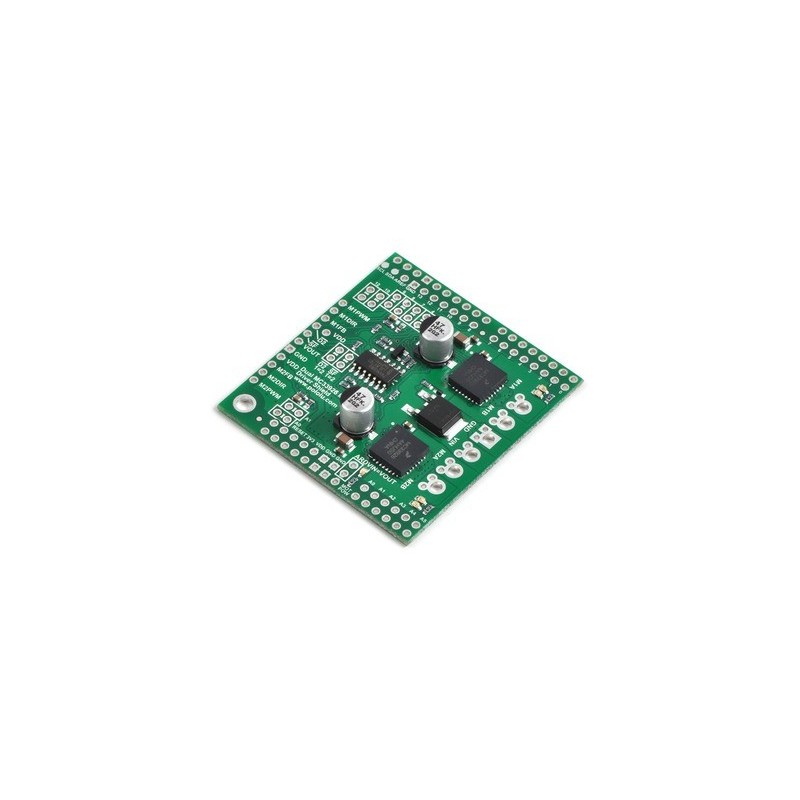



160,81 zł Netto
Pololu 2503 – Pololu Dual MC33926 Motor Driver Shield for Arduino przeznaczony do sterowania dwoma silnikami prądu stałego w projektach opartych na platformie Arduino. Nakładka typu shield integruje dwa mostki H MC33926, umożliwiając niezależną regulację prędkości i kierunku obrotów każdego silnika, co pozwala na realizację napędu różnicowego w robotach mobilnych i pojazdach autonomicznych.
Sterownik obsługuje silniki o dużym zapotrzebowaniu prądowym, zapewniając wysoki prąd ciągły oraz odporność na przeciążenia. Zintegrowane zabezpieczenia chronią układ przed przegrzaniem, zwarciem oraz nieprawidłowymi warunkami pracy. Konstrukcja w formie shield umożliwia bezpośredni montaż na płytkach Arduino, upraszczając okablowanie i skracając czas uruchomienia projektu. Moduł znajduje zastosowanie w robotach mobilnych, platformach edukacyjnych oraz prototypach wymagających solidnego i niezawodnego sterowania napędem.
Cechy
Producent BTC Korporacja sp. z o. o. Lwowska 5 05-120 Legionowo Polska sprzedaz@kamami.pl 22 767 36 20
Osoba odpowiedzialna BTC Korporacja sp. z o. o. Lwowska 5 05-120 Legionowo Polska sprzedaz@kamami.pl 22 767 36 20
Moduł rozszerzeń do budowy drukarki 3D lub maszyny CNC. Przeznaczony do współpracy z Arduino Mega i sterownikami silników krokowych A4988
Sterownik silników DC, który pozwala na kontrolowanie ruchu trzech napędów za pomocą interfejsu I2C. W zestawie płytka bez złączy. Pololu 5032
Brak towaru
Sterownik silników DC, który pozwala na kontrolowanie ruchu trzech napędów za pomocą interfejsu I2C. Płytka ze złaczami do montażu. Pololu 5031
Brak towaru
Sterownik silników DC, który pozwala na kontrolowanie ruchu trzech napędów za pomocą interfejsu I2C. Płytka z przylutowanymi złączami. Pololu 5030
Brak towaru
Sterownik silników DC, który pozwala na kontrolowanie ruchu dwóch napędów za pomocą interfejsu I2C. Płytka bez złączy. Pololu 5047
Brak towaru
Sterownik silników DC, który pozwala na kontrolowanie ruchu dwóch napędów za pomocą interfejsu I2C. Płytka ze złączami do montażu. Pololu 5046
Brak towaru
Sterownik silników DC, który pozwala na kontrolowanie ruchu dwóch napędów za pomocą interfejsu I2C. Płytka z przylutowanymi złączami. Pololu 5045
Brak towaru
Sterownik silników DC, który pozwala na kontrolowanie ruchu dwóch napędów za pomocą interfejsu I2C. Płytka bez złączy. Pololu 5044
Brak towaru
Sterownik silników DC, który pozwala na kontrolowanie ruchu dwóch napędów za pomocą interfejsu I2C. Płytka ze złączami do montażu. Pololu 5043
Brak towaru
Sterownik silników DC, który pozwala na kontrolowanie ruchu dwóch napędów za pomocą interfejsu I2C. Płytka z przylutowanymi złączami. Pololu 5042
Brak towaru
Sterownik silników DC, który pozwala na kontrolowanie ruchu dwóch napędów za pomocą interfejsu I2C. Płytka bez złączy . Pololu 5041
Brak towaru
Sterownik silników DC, który pozwala na kontrolowanie ruchu dwóch napędów za pomocą interfejsu I2C. Płytka ze złączami do montażu. Pololu 5040
Brak towaru
Sterownik silników DC, który pozwala na kontrolowanie ruchu dwóch napędów za pomocą interfejsu I2C. Płytka z przylutowanymi złączami. Pololu 5039
Brak towaru
Sterownik silników DC, który pozwala na kontrolowanie ruchu dwóch napędów za pomocą interfejsu I2C. Płytka bez złączy. Pololu 5038
Brak towaru
Sterownik silników DC, który pozwala na kontrolowanie ruchu dwóch napędów za pomocą interfejsu I2C. Płytka ze złączami do montażu. Pololu 5037
Brak towaru
Sterownik silników DC, który pozwala na kontrolowanie ruchu dwóch napędów za pomocą interfejsu I2C. Płytka z przylutowanymi złączami. Pololu 5036
Brak towaru

